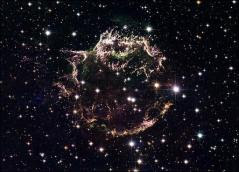 又到七夕織女會牛郎的日子,中國情人節,天上的牛郎織女星要怎麼看呢?願天下有情人終成眷屬。
又到七夕織女會牛郎的日子,中國情人節,天上的牛郎織女星要怎麼看呢?願天下有情人終成眷屬。May all lovers become couples.
Qi Xi also known as Magpie Festival, falls on the seventh day of the seventh lunar month on the Chinese calendar; thus its name. It is sometimes called Chinese Valentine's Day in recent years.Young girls traditionally demonstrate their domestic arts, especially melon carving, on this day and make wishes for a good husband.The story of Cowherd and Weaver Girl--In late summer, the stars Altair and Vega are high in the night sky, and the Chinese tell the following love story, of which there are many variations:A young cowherd named Niulang (Chinese: 牛郎; pinyin: niú láng; literally "the cowherd", the star Altair) happens across seven fairy sisters bathing in a lake. Encouraged by his mischievous companion the ox, he steals their clothes and waits to see what will happen. The fairy sisters elect the youngest and most beautiful sister Zhinü (simplified Chinese: 织女; traditional Chinese: 織女; pinyin: zhī nǚ; literally "the weaver girl", the star Vega) to retrieve their clothing. She does so, but since Niulang has seen her naked, she must agree to his request for marriage. She proves to be a wonderful wife, and Niulang a good husband. They lived happily and had two children. But the Goddess of Heaven (in some versions Zhinü's mother) finds out that a mere mortal has married one of the fairy girls and is furious. (In another version, the Goddess forced the weaver fairy back to her former duty of weaving colorful clouds in the sky because she could not do her job while married to the mortal.) Down on Earth, Niulang is very upset learning that his wife is gone. Suddenly, his cow begins to talk telling him that if he kills him and puts on his hide, he will be able to go up to Heaven to find his wife. With tears flowing, he killed the cow, put on the skin and carrying his two children with him and off he went to the Heaven to find Zhinü. The Goddess found out he had come and was very angry. Taking out her hairpin, the Goddess scratches a wide river in the sky to separate the two lovers forever (thus forming the Milky Way, which separates Altair and Vega).Zhinü must sit forever on one side of the river, sadly weaving on her loom, while Niulang watches her from afar and takes care of their two children (his flanking stars β and γ Aquilae or by their Chinese names Hè Gu 1 and Hè Gu 3).But once a year all the magpies in the world take pity on them and fly up into heaven to form a bridge (鵲橋, "the bridge of magpies", Que Qiao) over the star Deneb in the Cygnus constellation so the lovers may be together for a single night, the seventh night of the seventh moon.It is said that if it rains on the night of Qi Xi, they are the tears of Niulang and Zhinü crying at the misery of their life.See also: The Princess and the CowherdAs an interesting note, Barry Hughart's fantasy tale "Bridge of Birds" is loosely based upon this celestial story, though the two figures are switched here. The girl is forced to remain on earth, and her male paramour in heaven. She is a peasant girl, and he shepherds the stars.(From Wikipedi Qi Xi)
2 則留言:
Thank you Doris for teaching me more about your culture. I love this tradition!!!
Thanks Jadie ,I am embarrassed it's from wikipedi,But in Taiwan many girls pray to the god who unites persons in marriage,Hope can have a good husband on the seventh day of the seventh lunar month on the Chinese calendar.
張貼留言